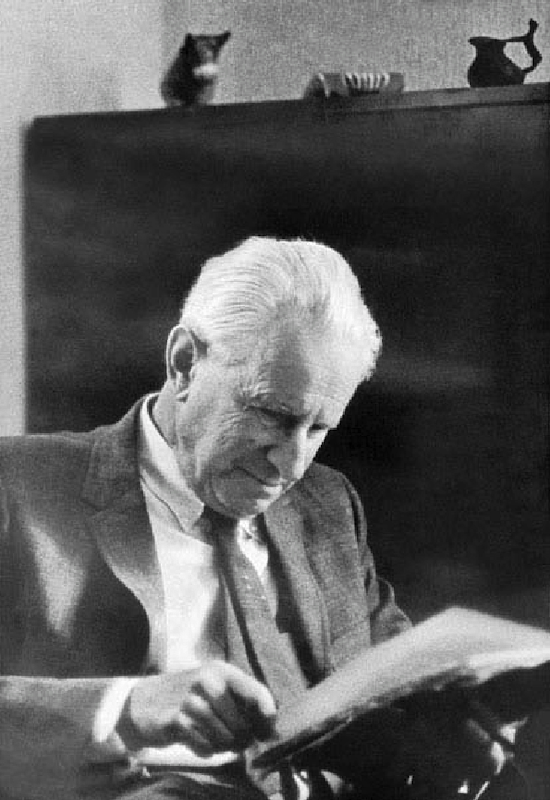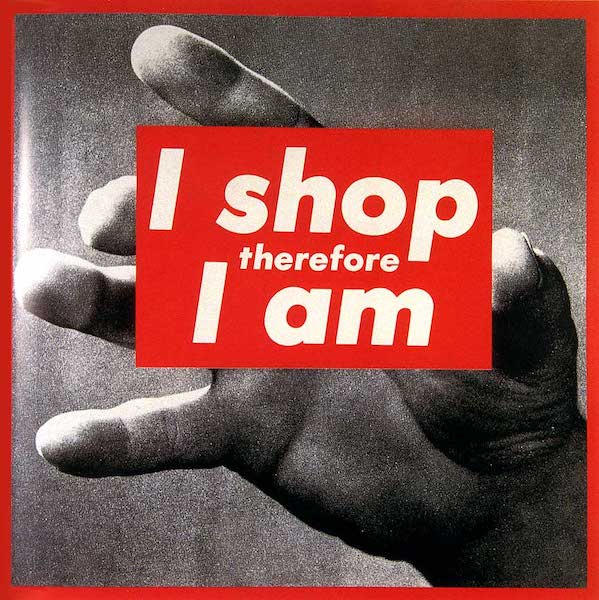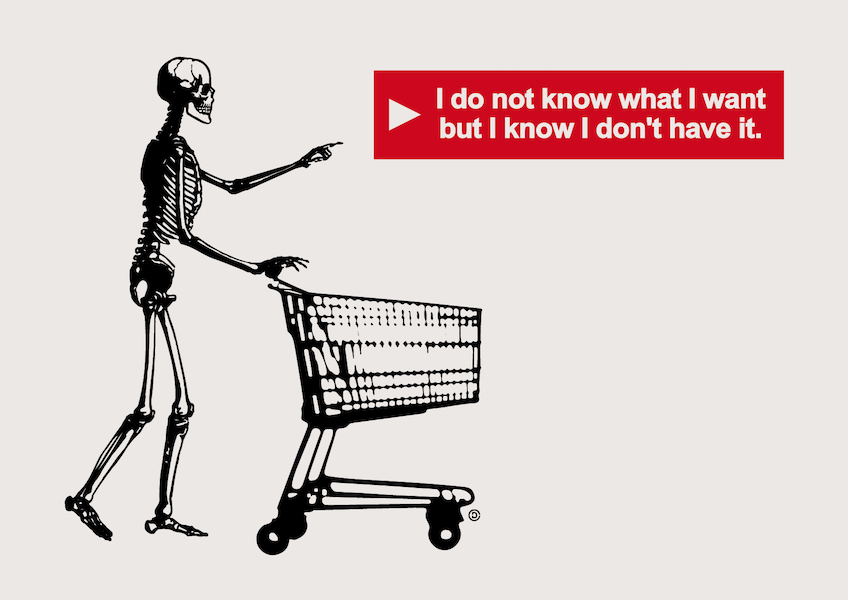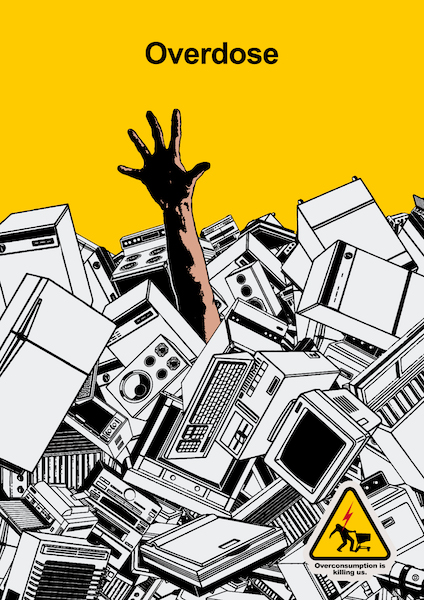New vs Used: An ecological debate
“The consumption society has made us feel that happiness lies in having things and has failed to teach us the happiness of not having things”
Elise M. Boulding
Anthropocentric consumer-driven culture
Consumerism has powered humanity for centuries and has progressively become a desirable way of life. Excessive and mindless consumption as a human economic activity has become the lifestyle choice of the masses, with consumers residing in both developed and developing areas around the world making about 1.7 billion people members of the global “consumer class.” Our consumerist culture continues to grow, making exploitative overconsumption, anthropocentric attitudes, and environmental damage our present-day reality.
Herbert Marcuse’s One-Dimensional Man claims, “The people recognize themselves in their commodities, they find their soul in their automobile, hi-fi set, split-level home, kitchen equipment.” Marcuse, in his solid critique of consumerism portrays capitalist society in a way that exposes human beings as extensions of their consumptions, far beyond the necessities of life. Marcuse’s theory also reveals how acquisition and materialism are strongly related to consumer behaviours and purchasing patterns. On a psychological basis, this idea compliments theories in Buddhism, which relevantly is a deeply ecological religion. For instance, early Buddhists would most likely “view the environmental crisis as a psychological crisis,” imposed by human “greed, selfishness, ignorance and apathy – and as such falling within the sphere of moral psychology.” (Keown, 2007) This perspective can help one to discover the reasons why people shop the way they do, how retail therapy can make them feel and just how easily over consumption has grown substantially and dangerously over time.

(Archive Center, Goethe University Library, Frankfurt. Courtesy of Peter Marcuse)
A shift towards conscious consumerism
Current findings suggest that the conscious consumption movement as a global trend is increasing in popularity at a persistent rate. Ethical and environmentally friendly buying practices and increased awareness on the impact of the topic, illustrate how consumer behaviour has begun to change in hope of driving positive social, economic, and environmental change.
To embrace the movement, rising consumption in society needs to be both addressed and redefined. An awareness on the impact of human consumption is essential to comprehend, whilst intending towards challenging the greater definition of human needs. Simply, one must ask oneself what are the exact implications of buying something? What is essential? What is excessive? The difference between necessities and luxuries will help point towards a redefinition of what it means to be human and what we really need in order to live in such a way that doesn’t destabilize natural and depleting resources and ecosystems.
Questioning products, processes, and services involved is also critical to better identify the environmental impact of over consumption. Try to think about this eco-centric practice next time you are mindlessly devouring your favourite snack. Rediscover and notice the piece of food on a physical and sensory basis, which can highlight everything, and everyone involved in the process of growth and transportation. This mindful process can help further develop an interconnected perspective on the world around us, or what is known as “the interrelationship or interdependence between the natural environment and the sentient beings living within it” according to the 14th Dalia Lama (1992).

Defending the planet and the modern consumer
Joanna Macy, a respected 91-year-old PHD scholar, author and environmental activist once stated, “If the world is to be healed through human efforts, I am convinced it will be by ordinary people, people whose love for this life is even greater than their fear.”
In terms of the ecological debate new vs used, Macy’s philosophy can illustrate a human approach to climate change whilst also defending the modern consumer. The above quotation can be helpful to better understand a changing world and a changing mind.
Recent studies suggest that 88% of consumers want brands to help them be more environmentally friendly and ethical in their daily life. In contemporary culture, sustainability has never been more significant. The fashion industry, which accounts to around 10% of global emissions is a particularly relevant example which can be used to illustrate this point. Notably, the fashion sector encourages overconsumption and has similarly been impacted by fast fashion. A number of fashion brands have recognized how making sustainability a focus and long-term goal in their business increases brand value and credibility and ultimately gains loyal attention, as well as connecting with the modern consumer on a more emotional and progressive level.
Additionally, shopping and storytelling go hand in hand, which is one of the main reasons why the modern consumer expects a personal experience. Transparency helps individuals to better understand the interconnected perspective of the world around us and the various stages of the journey where products evolve over time. Communicating and understanding where produce comes from, how it has been made, and the direct environmental impact can bring greater awareness to the importance of the human choice. Whether this means buying used items that tell a story and have unique histories, purchasing second-hand to give items a new lease of life or even investing in ethical and environmentally friendly products and brands to have a positive impact on the environment and to purposely buy into a more sustainable future.
The Pursuit of Human happiness
The Buddha taught the original Buddhist fundamental truth, “Craving is the origin of suffering.” Craving, in an ecological sense is illustrated in human activities such as over consumption and excessive behaviours that lead to unjustifiable attitudes towards the natural ecological world. This offers a unique insight into the crippling effects caused by human activities on a global scale. We live in an anthropocentric society that is driven by longing and pursuing for more and more at a constant and unsustainable rate. This spiritual truth can promote a holistic way of life by avoiding cravings such as excessive consumerism and fast paced lifestyles which lead to the suffering of the human and natural world. The relationship between happiness and consumerism is one that needs to be carefully presented because of the difference between necessities and luxuries. The definition is critical and must be obtained and clearly understood throughout global societies.
How long until you have it all? How long until you fill your void? How long until you’re satisfied? How long until you’re finally happy? These philosophical questions that have plagued us all our lives, reveal the home truth that the accumulation of material goods will and can never be enough. Acquiring excessively and over consuming in no way fosters human happiness and we must remind ourselves to live slowly. It is not just about choosing between new vs used. It is, however about buying into a more sustainable future, one which drives change, re-educates, eliminates impulse buying and retail therapy and one which promotes companies that create positive impacts within their produce on a global scale. Society must change the way goods are produced and consumed to buy into this future.
We are delighted to introduce Hayley Egan, a new Greenhouse Blogger.
We ask Hayley if she would join our community not only because she has so many amazing things to discuss, but also we knew as philosopher her blog posts would keep us on our toes. Or at the very least get us thinking with a more contemplative mindset. & what better topic to start than with a piece asking us to consider our consumption habits and our potentially unnecessary indulgences.
We look forward to more insights to come!
Welcome Hayley xx
Feature image: SHOPPER, I do not know what I want, but I know I don’t have it. (2003)
by Christopher Dombres



